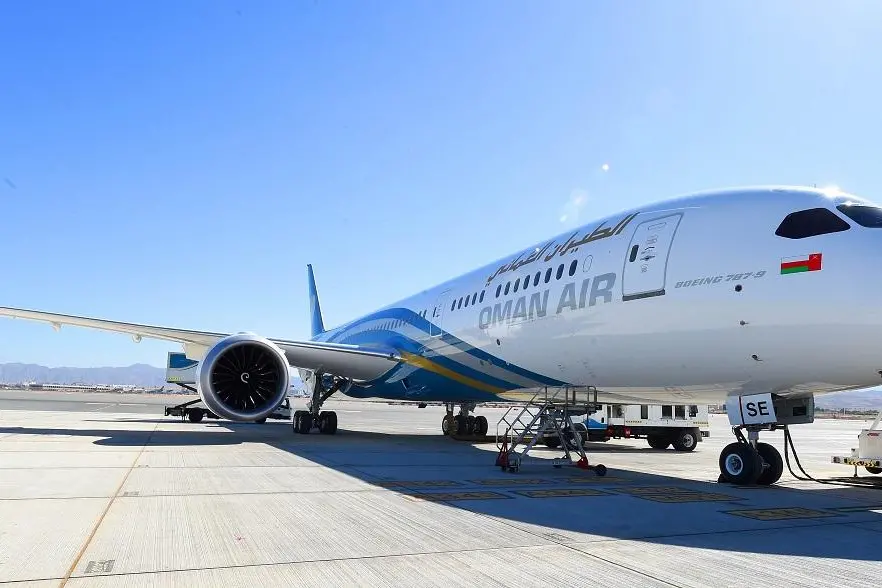PHOTO
Oman is stepping up investment in air transport, announcing the arrival of a new fleet of aircraft, routes to North Africa and Europe, and an expansion of existing flight services as part of a strategy to support growth in tourism and logistics.
In February national carrier Oman Air said it would initiate three new routes as part of its 2018 expansion plan, with flights to Casablanca, Istanbul and Moscow to commence in June, July and October, respectively. The announcement follows the launch of connections to Manchester and Nairobi last year.
The airline is also looking to strengthen its position in the Indian aviation market, and aims to more than double flights to the country, and explore the feasibility of opening new routes to Ahmedabad, Kolkata and Mangalore.
The expansion drive is part of a strategy that aims to expand the airline’s footprint to 39m passengers by 2030.
To achieve this goal, the carrier has invested in a new fleet of airliners, unveiling the arrival of a Boeing 737 Max in February. The 737 Max is the first of 30 it has purchased directly from Boeing. A further five are scheduled for delivery this year, with the remainder to join the fleet in the coming years.
To expand long-haul capacity and target more destinations in Europe and East Asia, in December 2017 the carrier also purchased one Boeing 787-9 Dreamliner; four more are expected for delivery in 2018.
Airline expansion key to tourism growth
The investment being channelled into Oman Air is central to the sultanate’s wider plans to spur tourism growth in line with its ninth five-year development plan, covering the 2016-20 period, and broader economic diversification strategy, which identifies tourism and logistics, along with manufacturing, as three sectors with strong expansion potential.
By adopting a destination-oriented business model, Oman Air is hoping to emulate the recent success of Iceland, which successfully catalysed tourism growth by investing in its national carrier, Icelandair.
The results so far have been promising. Passenger numbers grew by 10.9% last year to reach 8.5m, and the number of flights more than doubled from 31,000 to 68,500.
Airport infrastructure upgrades to support increased services
Increased investment in air links is also being supported by infrastructure expansion at airports.
A $1.8bn development at Muscat International Airport (MIA), which involves construction of a new 580,000-sq-metre terminal, is set to open on March 20. While some 14m people passed through the airport last year, up 17% on 2016, the project will initially boost annual capacity to around 20m.
A four-phase expansion schedule has been outlined for the terminal, which will see capacity rise to 48m once all construction is completed.
This development follows the opening of a new terminal at Salalah International Airport in 2015, which has increased passenger traffic at the site from 841,000 in 2014 to 1.5m in 2017. Sohar Airport, meanwhile, which opened in 2014, has added further capacity to the national system through the launch of international flights in July last year.
In addition, a new 8500-sq-metre terminal at Duqm is scheduled to open this year, boosting annual capacity by 500,000 passengers.
Infrastructure growth to boost logistics
Along with supporting the tourism industry, the expansion of Oman’s air transport capacity is also expected to complement growth in the logistics sector.
Freight transport at MIA increased by 24% last year, with cargo volumes exceeding 200,000 tonnes. This is likely to rise further, as global delivery firm DHL has started running weekly freighter operations between Muscat and Bahrain International Airport.
Expanded air connectivity has coincided with a series of investments in domestic road infrastructure. Recently completed projects include upgrades to the Batinah Coastal Road and the Bidbid-Sur dual carriageway, designed to improve traffic flows around the country, while work is continuing on the the Batinah Expressway – connecting Muscat to the UAE border – and the 240-km Adam-Thumrait road dualisation project.
Speaking at the Oman Ports Conference in Muscat in January, Ahmed bin Mohammed bin Salim Al Futaisi, minister of transport and communications, said that as part of the Oman Logistics Strategy 2040, the government was aiming to expand the logistics sector’s contribution to GDP to $7.8bn by 2020. If achieved, this would make of the logistics sector the second-largest economic contributor after hydrocarbons.
© Oxford Business Group 2018




















